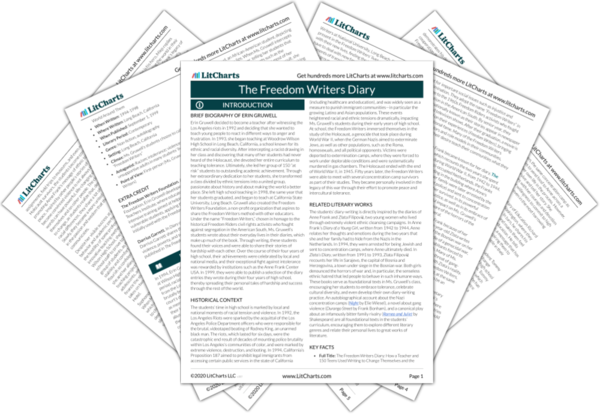The moment when Ms. Gruwell’s students read Anne Frank’s The Diary of a Young Girl (also known as The Diary of Anne Frank) constitutes a turning point in their lives. As they learn about the intense ethnic hatred and brutal war this young girl experienced, they come to identify with Anne Frank, given their own knowledge of gang rivalry and racial tension. Ultimately, like her, they realize that violence is never a solution to one’s problems. Instead, they begin to believe in the importance of loving and respecting people regardless of their racial or ethnic identity, and to trust in the power of the written word to effect personal and social change. Frank’s diary teaches the Freedom Writers the importance of emotion and subjective experience in education, such that engaging directly with other people, writing first-person diary entries of their own, and showing their own vulnerabilities becomes a crucial part of the Freedom Writers’ classroom experience. In this way, the diary becomes a symbol for the Freedom Writers’ hope and dedication to writing in the face of violence and injustice.
The Diary of Anne Frank Quotes in The Freedom Writers Diary
I asked, “How many of you have heard of the Holocaust?” Not a single person raised his hand. Then I asked, “How many of you have been shot at?” Nearly every hand went up. I immediately decided to throw out my meticulously planned lessons and make tolerance the core of my curriculum. From that moment on, I would try to bring history to life by using new books, inviting guest speakers, and going on field trips.
“Do not let Anne’s death be in vain,” Miep said, using her words to bring it all together. Miep wanted us to keep Anne’s message alive, it was up to us to remember it. Miep and Ms. Gruwell had had the same purpose all along. They wanted us to seize the moment. Ms. Gruwell wanted us to realize that we could change the way things were, and Miep wanted to take Anne’s message and share it with the world.
I have always been taught to be proud of being Latina, proud of being Mexican, and I was. I was probably more proud of being a “label” than of being a human being, that’s the way most of us were taught. Since the day we enter this world we were a label, a number, a statistic, that’s just the way it is. Now if you ask me what race I am, like Zlata, I’ll simply say, “I’m a human being.”
When Zlata wrote about Bosnian children becoming the “soldiers” and the soldiers becoming “children,” at first I didn’t get her meaning. After hearing Tony’s story, I understood. In war the innocence of a child is lost, and though the soldiers fee I theirs is a worthy cause, they behave like children when trying to achieve their goals. Knowing that a grown man entered a child’s bedroom stealing his innocence makes me sad.
Zlata said writing was her salvation during the war and it kept her sane. She suggested that writing might be one of the best vehicles for some of my students to escape their horrific environments and personal demons. Even though they’re not held captive in an attic or dodging bombs in a basement, the violence permeating the streets is just as frightening—and just as real.
Besides gang violence, domestic violence or spousal abuse is common. So common, in fact, that people ignore it, turn the other cheek, or go back to bed. I have watched men pistol-whip their girlfriends or smash their heads through car windows. Damn! I have seen a lot of crazy stuff. Stuff that makes me thankful it’s not me. It’s easier for me to pretend I don’t live where I live or see what I see. […] Writing about my pain will only make it worse.
“I know why the caged bird sings.” For many people this might sound like a normal poem, but to me it’s an analogy of my life. I sometimes feel as if I am a bird without wings and the door on my cage is not open. A bird doesn’t sing because it’s happy, it sings because it’s not free.
Although I’m not an expert on the subject, I’ve always felt that all kids yearn to rebel. Understanding this rebellious nature, I encouraged the Freedom Writers to use a pen as a means of revolution. Through their writing, they discovered they shared a common identity, which united them into a community that connected them, not separated them from the world. Unfortunately, the young men in Columbine didn’t share a community like the Freedom Writers. Instead, they were alone and on the fringe. Their cries for help fell on deaf ears. And rather than picking up a pen and finding a solution, they turned to guns and bombs instead.












